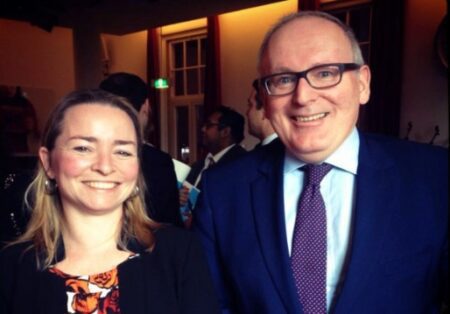On Monday 17 February the PES Democracy Network met on the invitation of the Dutch Labour Party PvdA, in the Humanity house in the Hague. 70 participants took part in this PES event, which was organised with the support of the European Forum for Democracy and the Foundation for European Progressive Studies (FEPS).
Protect and promote
Laffeber introduced Frans Timmermans, Dutch Minister for Foreign affairs, the keynote speaker who addressed the protection and promotion of human rights, democracy and the rule of law in Europe. ‘The EU has a great challenge to stand up for the rule of law. The rule of law applies to us as well’, minister Timmermans said. He underlined that the promotion of individual liberties must be combined with solidarity in society.
Article 2 of the Treaty of the European Union states that ‘ The union is founded on the values of respect for human dignity, freedom, democracy, equality, the rule of law and respect for human rights, including the rights of minorities’.
When countries wish to enter the European Union (EU), these candidate countries are subject to the very strict application of these rules and to regular and thorough monitoring. But once they have accessed the EU, or even when they have been EU member states for decades, it’s much more difficult to effectively address possible conflicts with regards to the rule of law or human rights violations.
What if the rights of minorities are not respected? Or what if democracy is being put under pressure? The scope of possible European action today indeed is seriously limited. Besides the soft power of political pressure, the only way to act is by using article 7 of the EU Treaty. This article introduces a procedure to alert and to signal. And it introduces a so called ‘nuclear option’, by which an EU member state may have some of its rights, including voting rights suspended. This option is so heavy that it’s so far never been used.
In Europe fundamental rights are challenged: governments who aim to eliminate political opposition and take away the most basic possibility of citizens’ political participation: the right to democratic elections.
The EU must meet the big challenge and improve the culture of rule of law. Mr Timmermans said that the development of political mechanisms to promote the rule of law is much needed. ‘We call for a “Copenhagen mechanism” to be set up to ensure compliance of all member states with EU common values and the continuity of pre-accession criteria’. This does not require the founding of new agencies or institutions. This requires a much better coordination, cooperation and use of the existing institutions.
Timmermans also underlined the challenge of legitimacy in the EU. ‘The European union has promised too much, and delivered too little’. He made a plea for the 3 main institutions: the Council, the Commission and the Parliament to come together to discuss a common political platform of key priorities for the next 5 years.
Promotion of democracy and rule of law in the EU is one of the key priorities for us social democrats in the run up and after the European elections of May 2014.
Practise and preach
The exchange between minister Timmermans and the participants of the PES Democracy Network was followed by a panel debate, lead by Marije Laffeber. The panellists: Maja Nenadović, independent researcher; Emine Bozkurt, PvdA Member of European Parliament in the S&D group; Jan Marinus Wiersma, research fellow at the Wiardi Beckman Foundation; andNatacha Kazatchkine, senior Executive Officer on legal affairs and human rights in the EU at Amnesty International EU office.
Some points raised by the panel. It’s rather hypocrite to only ask new member states to live up to the highest standards and not to ask to much of the states that have been around the block for sometime. So far rule of law has only been used in the framework of the internal market. It’s unacceptable that the position of minorities, such as the Rome population, is being jeopardised. Or that the rights of LGBT communities are being limited or that the right to self-determination of women is being reversed in our member states. It therefore is crucial to promote a culture of rule of law. Measurement tools for accountability must be developed to encourage member states to apply the highest standards. The consequences in article 7 are too strong, so it’s time to seriously work on gradual steps in between. This requires some introspection as well, we cannot only point towards others.
Marije Laffeber concluded by thanking the speakers and the participants for a lively exchange. ‘ This is not the end, but it’s the start of a political process. This theme is vital in the process to regain trust amongst European citizens. It therefore is good to be aware of the fact that we Social Democrats in Europe are taking the lead on this’.



